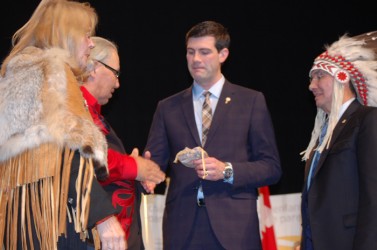Article Origin
Volume
Issue
Year
Emotions ran the gamut from forgiveness to anger to guilt to horror as honourary witnesses shared their reflections over the four-day national event of the Truth and Reconciliation Commission.
In an already emotionally charged statement, Edmonton Mayor Don Iveson broke down when he personalized the experience of children being taken from reserves and put into residential schools.
“I heard the testimonies of survivors who were taken from their families at about the same age my little boy is now and I can only begin to imagine the heart ache of the parents and the trauma to the child,” said Iveson.
Iveson was one of a dozen people inducted as honourary witnesses in the seventh and final national event hosted by the TRC. Honourary witnesses are prominent public figures who are tasked with listening and then sharing what they have learned with others.
Dr. Mary Simon, former president of the Inuit Tapiriit Kanatami, shared her heartbreaking story of the guilt she felt as all the children in her Nunavik community were taken to residential school but she and her siblings remained at home after she completed Grade 6. They were homeschooled by her father, a white man who spoke three or four dialects of Inukitut. After church on Sunday afternoons, Simon’s grandmother would take her and her siblings to visit the homes of parents who no longer had their children.
“We saw the parents, who had to let their children go…crying and grieving all winter,” said Simon, speaking through sobs. “So when I grew up I felt guilty. I felt I shouldn’t have had the comfort and love my parents gave me when I was growing up.”
TRC Commissioner Marie Wilson stood with a hand on Simon’s back as Simon spoke about the“deep depression” she went through at 40 years of age.
“I recovered over a period of time and today I’m strong, I am a happy person, I know that my people love me,” she said.
Mikisew Cree Nation member David Tuccaro spent four years in residential school, one year in Fort Chipewyan and three years in Grandin College, in Fort Smith, NWT.
“Today I wrote on a board in the other room, ‘I’m a survivor.’ It was alright. I’ve never done that before,” said Tuccaro, who owns and operates seven companies in Fort McMurray.
With his voice wavering, Tuccaro told how his brother was publicly humiliated at residential school, pulled by his ears until they were red. When their mother came to visit and saw the condition of her son, she took her children back with her.
“And, Mom, it’s not your fault,” Tuccaro said.
That same brother, Tuccaro added, is general manager of one of Tuccaro’s companies, which will generate $55 million in revenue this year.
Dr. Evan Adams, Deputy Provincial Health Officer for British Columbia and actor, shared that both his parents attended residential school. He talked about being at another TRC event, where he was asked to speak.
“I followed a nun who said, to the audience, ‘For the most part my colleagues were trying to do their very best.’ And I was filled with such a fury for so many hours, I could not sit still and finally cried my eyes out trying to resolve it, what I was feeling,” said Adams. “And I think as an intergenerational survivor, of course, we wished that our Elders and family members had better lives than they received.”
For the past 12 years, Adams has worked with Aboriginal people, many of them at the end of their lives.
He spoke of one patient, “She absolutely reminded me that the point of our lives is not to be sad or to hate or to get fancy degrees or to be self-important or to get the best of each other, but to be extraordinary human beings…. Today I leave completely happy that so many of you have found greatness inside of yourselves as our ancestors would have us.”
- 2916 views

